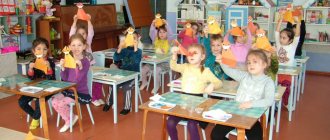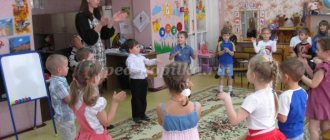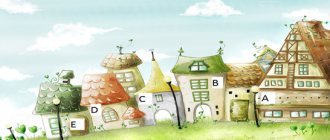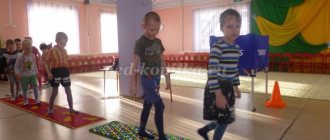Summary of a music lesson in a senior group using singing technology.
Summary of a music lesson in a senior group using singing technology.
Topic : "Magic apple tree."
Educational field : “Artistic and aesthetic development.”
Target:
Development of vocal and choral technique in children of senior preschool age.
Tasks:
v Master vocal and choral skills
: singing attitude, correct sound production, breathing, diction and articulation, purity of intonation, harmonious, coordinated singing.
v Develop the vocal apparatus, musical memory
, attention, imagination, artistic qualities.
v Develop the ability to independently come up with melodies on a given topic using and without a model.
v Develop hearing, the ability to listen, directing
attention to a more subtle discrimination of the qualities of what is heard.
v To consolidate the ability to sing independently, individually and collectively, with musical
with or without accompaniment.
v To develop children’s dance and play creativity, the ability to move expressively and rhythmically in accordance with the diverse nature of music
.
v Enrich children's musical experiences
, causing a vivid emotional response when perceiving
music
.
v Improve speech, express your thoughts clearly for others, expand the active vocabulary of children.
v To develop the ability to perform special breathing exercises that help improve the health of the respiratory system and strengthen the nervous system.
v Form the habit of maintaining correct posture while singing.
v To cultivate aesthetic taste, performing and listening culture of children.
v Foster a sense of friendship, mutual assistance, and a desire to help.
Material and equipment:
visual aids -
“Baba Yaga”
,
“Apple tree with false apples”
, a ball, Alyonushka doll, cardboard candles with
“light”
- for each child, magnetic board, phonogram of the play
“Baba Yaga”
by P. I. Tchaikovsky, phonogram songs
“Grandma Ezhka”
music and lyrics by T. Morozova, phonogram
“sounds of nature”.
Progress of the lesson:
Introductory part : (5 min).
Children enter the hall to the music, and a musical greeting is held.
Musical director
: guys, today we will go to the fairy forest, and in order not to get lost, a ball will help us. But he will only help us if we sing and not talk.
There is a vocal and communicative game “Hello!”
Children stand in a circle and sing a phrase one by one, calling the name of the child to whom they pass the ball: “Hello Seryozha!”
etc.
Musical director
: Oh, something has gone dark.
How can we find our way? Our magic ball has rolled off somewhere... Let's light the candles. Candle lights will light our way. Just try to blow evenly so that the candle light does not go out. (forest music sounds)
Children take cardboard candles with “lights”
made of organza and blow on them so that the light deflects smoothly and not sharply. Then they sit down, putting the candles on a tray.
Main part (18 min.)
Musical director
: We came to a forest clearing. Let's sit down and relax. But what do we hear? Noise, thunder, whistle. What is it?
Children listen to the play "Baba Yaga"
from
“Children's Album”
by P. I. Tchaikovsky.
What strange music did we just hear, what did it sound like (children’s answers)
Was the music melodious, slow, calm, or something else? What fairy-tale hero or character from a fairy tale do you imagine when listening to such music? Yes you are right. This is Baba Yaga flying in her mortar. In the music you can hear how Baba Yaga hobbles, leaning on a stick, and then flies in a mortar, driving a broom, she threatens, gets angry, casts a spell, spins and suddenly disappears, falls through the ground.
Let's tell a scary tale about Baba Yaga. It starts something like this:
Musical director
shows the “Baba Yaga” manual, the children make a wave with their voices, gliding the vowels up and down.
The next moment Baba Yaga (character) enters the hall.
Baba Yaga:
Well, guys, hello, you were telling a scary tale about me here, you’re teasing me, so you didn’t expect me to come to you myself? But I hid Alyonushka from your favorite fairy tale, yes... and you will no longer have any fairy tales and she will not return to you until the apples on the apple tree are ripe, ha-ha-ha,
Musical director
: Oh guys, what should we do?
And I think I know what Baba Yaga was talking about. I have a magic apple tree. Just look, there's something missing on it. (children's answers)
. Of course, apples. But this magical apple tree will bear fruit only if we sing beautifully.
Do you like to sing? (children's answers)
then let's start. First, let's sit down nicely.
A game is played to develop correct posture when singing “Baba Yaga”
Music and lyrics by M. Kartushina.
Here sits Baba Yaga, The children sit hunched over, lowering their
She's very scary. shoulders, legs apart, arms hanging down.
We don’t want to be like that – They quickly straighten up and put their feet down
We sit very straight. nearby.
Well done boys! Correct posture helps your voice sound bright and clear. The first apple appears on the apple tree.
Did I hear a cuckoo singing in the forest? She sings like this: (teacher demonstration)
A vocal exercise is performed on the sounds of a major triad, transposed up and down, to the syllable “ku”
.
Now let’s sing differently, listen (teacher demonstration)
A vocal exercise is performed using a labial vibrant - progressive movement of the melody up and down.
Well done, they sang well, another apple appears on the apple tree.
Musical director
: Do you guys like our apple tree?
(children's answers.)
Come up with beautiful words for her, describe her, what she is like.
(slender, beautiful, green, curly, plump, ripe sweet apples) Let's come up with a song about her. You can sing to a familiar tune, or come up with your own. (vocal improvisation of children)
. Well done, we have another apple!
Guys, in difficult times, who comes to the rescue? of course a friend, are you guys friendly? (children's answers)
I even know a song about you, it’s called
“Song of Friendly Guys
,” listen carefully to how it sounds.
Performed “Song of Friendly Guys”
music by S. Sosnin, lyrics by I. Chernitskaya.
Musical director
: Guys, what is friendship for?
And how do the words about friendship sound in the song, in what character (children’s answers, the melody is melodious, leisurely or bright, ringing, cheerful (children’s answers)
. Well, let’s learn this wonderful song and another juicy apple will appear on our
apple tree
.
Learning a song by phrases.
The teacher praises the children and apples appear on the apple tree.
Final part (7 min.)
Musical director
: we just have to hang the last apple on the apple tree and our Alyonushka will be freed from Baba Yaga’s witchcraft.
What do you think Baba Yaga is afraid
of ?
Children repeat dance movements after the music director.
The last apple appears on the apple tree, Baba Yaga returns Alyonushka.
Summing up. The children sing “Goodbye” and go to the group.
Vocal club lesson in kindergarten. Notes for older children
Vocal circle classes for children of senior preschool age using health-saving and gaming technologies
Goal: - Create a joyful, friendly atmosphere that contributes to the child’s successful entry into the world of vocal art. Objectives: - Learn to sing meaningfully and expressively, purely intoning the melody of the song;
— Develop the mobility of the articulatory apparatus, expand the singing range of children; — Develop creative abilities by involving children in singing songs, poems, and speech games; — Form a clear, clear singing diction; — To foster an interest in singing in children. Lesson notes for the vocal club “Rosinka” for preschoolers
(Children enter the hall freely in groups).
1. Communicative game - greeting “Hello” (model M. Mishakova) Musical director: Hello, my friends, I’m glad to meet you! Hear, the bell is ringing, (the bell is ringing). He calls you all to the circle. (Children stand in a circle) A bright and funny ray of mischievous “catch” the sun’s rays
with your palms, jumping around happily and
wagging your finger.
He always plays pranks, and tickles, yes.
raise your nose
He gives noses to girls and boys.
“tease” a ray of sunshine
Musical director: Well done, children!
And now my guys, guess the riddle. Riddle: Tell me, friends, what can we not sing without? (tongue). Musical director: I know a fairy tale about a tongue. Want to listen? (Children answer). Once upon a time there was a tongue. He woke up very early and always started his day with exercise. 2. Articulation gymnastics: Here is a tongue exercise: (Children perform movements according to the text of the game). The tongue turned to the right, to the left. on the side. Children, stroking their cheeks with their tongues
, open
right and left
tongues,
perform the “Chatterer” exercise.
And now, friends, no joke, let’s brush our teeth with our tongue.
They pass the tongue several times over
Let's Smile to All Friends,
the upper teeth, then along the lower teeth,
you can't sing without smiling.
They smile, stretching their lips wide.
Musical director: Tongue was a fidget, he was very curious and did not like to be bored. One day, the tongue opened the door wide, looked out into the street to see what was going on there, and saw that a cold wind was blowing outside, but this did not frighten him at all.
3. Breathing exercises. Exercise "Wind"
(a model of a birch tree is placed in the center of the hall) Musical director: A strong wind has blown,
Children come up and blow on the branches and
do a lot of things at once:
with yellow strings attached
all the trees,
with leaves, trying to inhale
the leaves from the tree, plucked,
with their nose, exhale noisily with their mouths
He swirled them high,
with his lips elongated into a tube.
and rushed away.
4. Intonation exercise “Blizzard” (an exercise to loosen the chin according to the method of D. E. Ogorodnov) Children put their fingers to their cheeks (fingers through the cheeks lie on the lower lips), while singing the sound “U” at the height of C or D). The wind howls “oo-oo-oo”, and “oo-oo-oo” the children sing on the same sound o-oo-oo
the wind is boring alone.
staccato
Wind, wind, don't be bored,
oooooo legato
And play with me.
glissando up
Musical director: Children, did you like this game?
But we didn’t just play, we did exercises for our breathing, and without proper good breathing there is no voice. Little Tongue looked out of his house again, looked up - and saw that the sun was shining. The tongue was happy, left the house, and sang his favorite song. 5. Work on the song “The Sun is Shining” by A Ermolova, lyrics by V. Orlova. Musical director: To make a song interesting for everyone to listen to, you need to convey its mood. Stage I of working on a song – familiarization, perception. • expressive display of a new work in its entirety. • conversation about the nature of the song, thereby trying to awaken interest in it and a desire to learn it. (I draw attention to the mood conveyed in the music, I awaken children to speak about the nature of the song as a whole, about the change in mood in its parts. This conversation about the emotional and figurative content of the song helps to set the children up for expressive performance, to choose the appropriate character of the song, sound formation, diction , breathing. For example, if the children have determined the nature of the song as affectionate, gentle, calm, I explain to them that they need to sing it in a melodious, drawn-out manner.) Stage II - learning the song. • we teach the song in parts: phrases, sentences, couplets; • techniques “Sing to yourself”, “Show the movement of the melody with your hand”; “Singing in a chain” • explanation and demonstration of where and how to take the breath, how to distribute it among musical phrases. I draw your attention to the singing setup. • To develop correct diction, I use expressive reading of the text, explaining the meaning of some unfamiliar words, their correct and clear pronunciation, reading the text in a whisper, with clear articulation. Stage III – performance of the song. Musical director: The tongue was happy, came out of the house and sang its cheerful song! From such a cheerful song, the tongue became very cheerful and joyful, and he decided to go on a journey, and he met little frogs. Here are the frogs jumping along the path, let's play with them. 6. Play massage by M. Yu. Kartushina “Frogs”. The little frogs stood up in unison, a spring, fingers spread wide apart.
They showed their paws
out
their arms bent at the elbows.
Backs bend
slightly bend back
The frogs
smile, smile . Paws slapped. Slap on the chest, on the arm,
clap on the chest, on the arm.
On the sides and on the back. .
on the sides, on the back,
on the other hand, and were not tired at all.
pat the second hand from the hand to the shoulder
clapped on the
legs from bottom to top
And then, and then with
fists we rub our arms, chest, sides, back, legs
with our fists we rub everything with our palms we stroke ourselves with our palms we
stroke ourselves with our palms
and we straighten our back
straighten our back. Musical director: “But the night has come, it’s time for the frogs to sleep! Tomorrow a new day will begin, A new day will smile at you!” Musical director: Tongue was also tired, he wanted to sleep. He said goodbye to his friends: “Goodbye” and ran to his home. He locked the door, lay down in bed and fell silent. Musical director: So the fairy tale about Tongue ends. And our lesson came to an end. Tell me what did you like most today? (I have a conversation with the children, listen to the answers, clarify their ideas) Musical director: Saying goodbye, as you know, is not very interesting. But we will nod our heads, wave goodbye, and together we will say: “Goodbye!” (Children say goodbye to the guests and leave the hall). Photos from the lesson
We recommend watching:
Summary of integrated joint activities in the preparatory group Musical and sports entertainment for kindergarten. Senior - preparatory group Musical entertainment in the preparatory group of the preschool educational institution Musical holiday in the preparatory group of the preschool educational institution based on Chukovsky's fairy tales. Scenario
Similar articles:
Scenario for a musical festival for preschoolers




